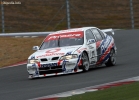Crash Test Nissan Primera Sedan 1996 - 1999 Sedan
Crash test Nissan Primera Sedan 1996, 1997, 1998, 1999: Laboratory Water Safety Assessment: Rankings in points, test report (photo and video crash test)
19%
Driver and passengers
10%
Pedestrians
Protection of the driver and passenger
 Frosting, driver |
 Front punch, passenger |
 Side blow, driver |
|
Children's holding devices
| Child up to 18 months | No information |
| Child older than 3 years | No information |
Pedestrian safety
 |
|
Comments:
PRIMERA generation, which began in October 1996, earned three stars behind the frontal and lateral blows. With a frontal blow, the car showed itself well, although the compression of the leg deepening was excessive, and the rigid elements at the bottom of the front panel were a threat to the knees, the heads and the hips of the driver. The car complies with the requirements of 1998 on security with lateral impact. The tested sample was equipped with a safety pillow for the driver, which provided proper protection. Later, options - side airbags were added to the list of basic configuration.Front punch:
The front rack shifted back only 58 mm. The passenger salon was not much deformed, although the driver's door was lit, and it could not open it without tools. However, the passenger door opened normally. From the blow, the steering wheel shifted back to 80 mm and up 64 mm. The deepening for the legs was compressed, and the brake pedal shifted back by 350 mm. The protection of the head and neck of the driver is recognized as good, and the contact of the head of the airbag ¬ stable. Passive security systems were able to prevent the driver's chest contact with the steering wheel. The left knee of the driver hit the roof column, the lever of its adjustment and the lower part of the front panel. If the blow had fallen a little right, there would be more hard contact with the knob adjustment lever or the ignition lock, raising the risk of injury. If the knee had penetrated deeper into the front panel, then the risk of getting the injury would be even higher. Right knee, in turn, hurt the coil of the steering column and hit the front panel. If the blow fell a little to the side, it would fall into the steering column adjustment mechanism or even its castle located above. The compression of the deepening for the legs was significant. As a result, the proper protection of the feet and the ankles is not secured. With a frontal blow, the passenger turned out to be well protected - the safety of the head, neck, knees, the legs, the feet is estimated by high marks. The sole exception was the chest, exposed to a large load from the seat belt.Security of passenger children:
There is a small incompatibility between chairs for children and seats, but not so big to create a threat to the security of passenger children.Side strike:
The chest, the abdominal and pelvic drivers hit the door, was the risk of damage. Head protection is good.Pedestrian safety:
The protection of the head of the young pedestrian. Four of six checkpoints complied with regulatory requirements. Another point was close to it. The point above the rack of the shock absorber showed the result better than the average. The hood and wing joint place was worse than the middle. Protection of legs. None of the control points corresponded to regulatory requirements, although one - near the castle of the hood - was close to it. Adult head protection. Three points showed the result better than the average, three - worse. One of them is located near the left wiper. Protection of legs. None of the three control points corresponded to the regulatory requirements, worse than the average.General information about the car
| Roelf location | On right |
| Tested model | Nissan Primera 1.6 GX |
| Body type | 5-door hatchback |
| Year of publishing data | 1997 |
| Curb weight | 1219 |
Installation Systems:
| Pretensels of front seat belts | There is |
| Front Belts Load Loaders | No |
| Driver Front Airbag | There is |
| Passenger Front Airbag | No |
| Side airbags | No |
| Side Head Airbags | No |
| Driver's knees and feet airbag | No |












